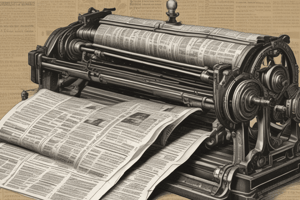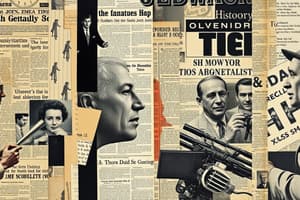Podcast
Questions and Answers
Who is credited with the first newspaper interview?
Who is credited with the first newspaper interview?
- Andrew Johnson
- Horace Greeley (correct)
- James Gordon Bennett
- E. L. Godkin
When did leading urban dailies start hiring reporters to gather news?
When did leading urban dailies start hiring reporters to gather news?
- 1840s
- 1820s (correct)
- 1830s
- Late 1600s
What did E. L. Godkin, editor of The Nation, think of the new journalistic form of interviewing?
What did E. L. Godkin, editor of The Nation, think of the new journalistic form of interviewing?
- He criticized it as a joint production of hack politicians and newspaper reporters (correct)
- He was indifferent towards it
- He had no opinion on it
- He praised it as a valuable form of journalism
Which country's journalists were teaching Europeans that their own elites would submit to interviews?
Which country's journalists were teaching Europeans that their own elites would submit to interviews?
Who was the first person to interview the president of France?
Who was the first person to interview the president of France?
Who interviewed Pope Pius XI in 1929?
Who interviewed Pope Pius XI in 1929?
What was the standard practice before publishing an interview?
What was the standard practice before publishing an interview?
What is one way in which journalism changed over time?
What is one way in which journalism changed over time?
What effect did the interview have on the reporter's role in journalism?
What effect did the interview have on the reporter's role in journalism?
When did interviewing first appear as a technique in journalism?
When did interviewing first appear as a technique in journalism?
What was one reason why Bell was vulnerable to manipulation by the leaders he interviewed?
What was one reason why Bell was vulnerable to manipulation by the leaders he interviewed?
What is one part of the conspiracy in an interview?
What is one part of the conspiracy in an interview?
What did reporters in the late nineteenth century usually do during interviews with politicians?
What did reporters in the late nineteenth century usually do during interviews with politicians?
Why did Eleanor Roosevelt's devout following of women reporters refuse to print a story about President Roosevelt's refusal to sign a joint proclamation?
Why did Eleanor Roosevelt's devout following of women reporters refuse to print a story about President Roosevelt's refusal to sign a joint proclamation?
Flashcards are hidden until you start studying
Study Notes
The Origin of Newspaper Interviews
- James Gordon Bennett is credited with the first newspaper interview, conducted in 1836.
Evolution of Journalism
- Leading urban dailies started hiring reporters to gather news in the 1830s.
- The interview emerged as a technique in journalism in the 1830s.
Criticism of Interviews
- E.L. Godkin, editor of The Nation, viewed the new journalistic form of interviewing as "vulgar" and "impertinent".
International Influence
- Journalists from the United States were teaching Europeans that their own elites would submit to interviews.
Notable Interviews
- Enrique Deprez was the first person to interview the president of France.
- Dorothy Thompson interviewed Pope Pius XI in 1929.
Publishing Practices
- Before publishing an interview, the standard practice was to submit the article to the interviewee for approval.
Change in Journalism
- One way in which journalism changed over time is that the interview shifted the focus from events to personalities.
The Role of Reporters
- The interview had a significant impact on the reporter's role in journalism, as it increasingly involved asking questions and gathering quotes.
Vulnerability to Manipulation
- One reason why Bell was vulnerable to manipulation by the leaders he interviewed was that he was too willing to accept their statements at face value.
The Conspiracy in an Interview
- One part of the conspiracy in an interview is the agreement between the reporter and the interviewee to present a certain image or message.
Reporting Practices
- Reporters in the late nineteenth century usually wrote down quotes from politicians without asking follow-up questions during interviews.
Refusal to Print a Story
- Eleanor Roosevelt's devout following of women reporters refused to print a story about President Roosevelt's refusal to sign a joint proclamation, demonstrating their loyalty to the First Lady.
Studying That Suits You
Use AI to generate personalized quizzes and flashcards to suit your learning preferences.




